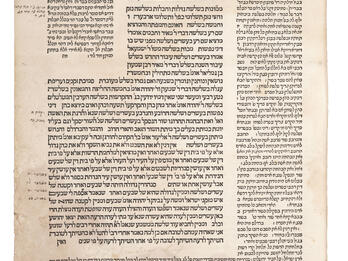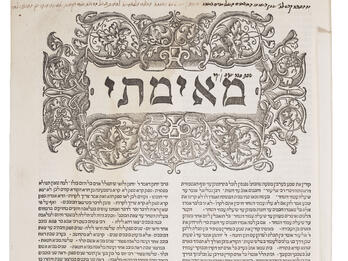Colophon: Maimonides’ Mishneh Torah
The great work called Mishneh Torah by the rabbi, our master, Moses ben Maimon of blessed memory, comprises fourteen books.
Were it not that the Lord was with us (Psalms 124:1), the Torah might have been forgotten by the Jews, for no one seeks it and no one wishes to hear its studies. The days have come about which it is said: Bind up the testimony, seal the law among my disciples (Isaiah 8:16). Even the sacred books, and the earrings and the necklaces (Isaiah 3:20) are wholly consumed by the terrors (Psalms 73:19) of the Expulsion and the fury of the oppressors since the Lord rained the curse and the evils upon the exile of Jerusalem in Spain [see Obadiah 1:20]. For we have been poured from vessel to vessel, and have gone into exile, and have become weary and been given no rest. The roar of the waters of troubles that afflict us have constantly blackened the face of our congregation like the side of a pot, from the time its elevated status was removed, and its ornament and jewel were taken away, and it has worn widow’s robes.
We have seen the whole multitude of Israel sitting idle from Torah study because of the hardness of the times, and the vexations of the age do not give their spirit rest. Even when they had enough time, their steps faltered due to the unavailability of books. If perhaps someone might be found who would agree to go to buy Ha-yad ha-ḥazakah [lit. “The Strong Arm,” another name for the Mishneh Torah] or the Magid mishneh [a commentary on the Mishneh Torah] or books of notes or commentaries [on the Mishneh Torah], all of these books are sold at very high prices, and his resolve would falter. All of the above were powerful reasons for people to free themselves from the yoke of study, but they remained hungry and thirsty for Torah and the service of God.
Now our Lord God has shown us His glory and greatness, as He has called upon [see Exodus 35:30] two brothers, printers, namely his honor R. David and R. Samuel Naḥmias. None are their equal in Israel, expert craftsmen, who carve skillful works. God has given them wisdom and understanding to do the work [see Exodus 35:31] of printing books with ink, with an iron and lead pen. In their wisdom they have established a printing house from its foundation, and through them, with the assistance of the Helper, blessed be He, books have become abundant among the Jews. They shall obtain gladness and joy (Isaiah 35:10); each sharpens the countenance of his friend [see Proverbs 27:17]. How good and pleasant it is for brothers to dwell together (Psalms 133:1).
God, our Shepherd, has placed His influence upon us and appeared before us and made it happen for us. . . . Hebrew men, among the notables of our nation, honorable and splendid men such as R. Joseph ben Muvhar Sephardi and R. Moses ha-Levi Ashkenazi, may the Rock preserve him, who is known as de Modena. They have taken the initiative to support those who do the work, as with their wealth and capital they take upon themselves the lion’s share of this great religious deed, in honor of the Torah, in order to support and uphold it. The spirit of the Lord has rested upon them, the spirit of counsel and might [see Isaiah 11:2], to bring out splendid books at a low cost, volumes that are difficult to find. All who seek God will find peace in them, and there the weary of strength shall rest [see Job 3:17]. They agreed without fuss to print in the Assyrian script [the square Hebrew printed letters] the book Ha-yad ha-ḥazakah, which is called the Mishneh Torah, and which was written by the great Light whose name was Rambam [Maimonides]; the Lord was with him. Opposite and around his tent there are camped [see Numbers 2:2] in splendid writing the Magid mishneh and the Hagahot Maimuniyot [Notes on Maimonides by Meir ha-Kohen (Germany, thirteenth century)], in these volumes of laws that are practiced nowadays. In other books, there are the commentaries of the great rabbi the Ra’avad [Abraham ben David of Posquières], for in these we find the fatness of our portion, and the wishes of the Lord will be successful through us. Admittedly, some of the volumes do not include the Magid mishneh, and although we searched for it everywhere, we did not find it. Since these splendid brethren did not want to produce anything imperfect, they included in these books, instead of the Magid mishneh, other splendid works of great usefulness, which will enlighten the eyes of those who peruse them. For they work in good faith (2 Kings 12:16); and may the beauty of the Lord our God be upon them: and establish the work of their hands upon them [see Psalms 90:17].
And I, the young Abraham, son of my lord his honor R. Joseph Ibn Ya‘ish of blessed memory, when I saw the precious glory of this work, this religious treasure, whose value cannot be measured in gold or an ornament of fine gold (Proverbs 25:12), I sought to motivate those performing the work and their backers, those in charge of the negotiations. I offered words of praise and encouragement to them, to inspire them to complete this awesome task, and the Lord helped me to make it happen and to draw out the potential into practice. I also set my heart and soul on proofreading and editing the book, according to the good hand of my God upon me (Nehemiah 2:8), together with diligent sages who performed some of the corrections. Thus, men of good heart, listen to me and may you receive a good blessing; go to purchase this precious book, for all the trees of Eden, those works that have been printed to this day, do not equal it in greatness and splendor. Take a double sum in your hand (Genesis 43:12), for they have labored on your behalf for the double of the hire of a hired worker (Deuteronomy 15:18). Happy is he who grasps this book, in his fate and fortune, as he has received it from the Lord.
This fine book was completed in the first month of Adar in the year 5269 to the Creation [1509] in the great city of Constantinople, ruled by . . . King Sultan Bayezid, may his glory be exalted and may his kingdom be raised in his days and in our days may Judea and Israel be redeemed and dwell in security. Amen, may it be His will.
Credits
Abraham ibn Ya’ish,“Colophon” in Maimonides’ Mishneh Torah (Constantinople: 1509). Reprinted as: Jacob b. Haim ibn Adoniahu, proofreader; “Colophon at the end of Seder Taharot (Hebrew),” in Yaʻakov Shemu’el Shpigel, Chapters in the History of the Jewish Book, Scholars and their Annotations by Yaʻakov Shemu’el Shpigel, (Ramat Gan: Bar Ilan University, 1996), 234–235.
Published in: The Posen Library of Jewish Culture and Civilization, vol. 5.




